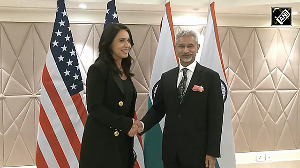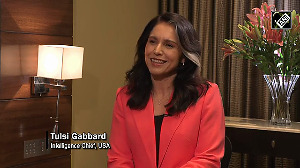The Forbes list of the world's billionaires, published a few weeks ago, threw up an interesting fact: that the Ambani brothers (Mukesh and Anil) have grown their wealth and improved their rankings pretty dramatically in the last one year, in the wake of their decision a couple of years ago to go their separate ways.
In the last one year, Mukesh Ambani's wealth has shot up from $8.5 billion to $20.1 billion, enabling him to leapfrog from 56th position in the global rankings to the 14th. Even more impressively, Anil Ambani's wealth has grown from $5.7 billion to $18.2 billion, improving his ranking from the 104th position last year to the 18th this time.
If you are wondering why this is significant or important, the point is that the Ambani brothers, working individually and not as a team, have grown their wealth far more successfully than in the past, when they were supposedly working together.
It is not just the Ambani siblings. Take the case of the Bajaj family, which has suffered from internal dissension in recent years. After 2003, when Rahul Bajaj and Shishir Bajaj decided to part ways and chalked out their independent plans, Bajaj Auto under a new generation of young leaders has considerably improved its market position, while the Kushagra and Shishir Bajaj-led Bajaj Hindustan has set a scorching pace of growth in the sugar industry.
The two groups independently have done better than the combined group was doing earlier.
The question therefore poses itself: Are splits good for family-run businesses in today's environment? The instinctive answer would be in the negative because resources get divided, the advantage of size gets lost as the group splinters, the split itself is usually messy, distracting and drawn out over a longish period, and the division of companies or divisions is often engineered with little thought to business logic and the interests of minority shareholders.
Yet, the facts on the ground would suggest that splits may end up benefiting everyone concerned. The reasons for this vary. Those held back from developing their full potential within the broader family setting are able to find full rein when they operate on their own and are answerable primarily to themselves and not to family elders.
Competitive rivalry and jealousy probably play no small part, because family splits are rarely amicable, and after the split each new branch wants to make a point to the others--as was clearly evident, for instance, when the Duncan Goenkas split back in the 1980s and RP, GP and JP Goenka went their separate ways but found that they were sometimes bidding against each other to acquire a company.
To some degree, the positive performance post-split is a reflection of the opportunities waiting to be tapped in a buoyant Indian economy. Also, in the past, access to funds was a problem and therefore the bone of contention among family members was often on how to carve out a bigger share for each sub-group.
Now family members realise that finance is usually not a constraint if you have a good business idea. It may also be a material fact that when a conglomerate splits, you get independent parts that are focused on a single product or market segment--and therefore the well-documented advantages of core competence kick in.
Finally, with large families less strongly knit, and with each new member better-educated than before, the itch for a meaty business role for everyone concerned often overcomes the pressure from family seniors to try and stay together in what may often be sub-optimal arrangements.








 © 2025
© 2025